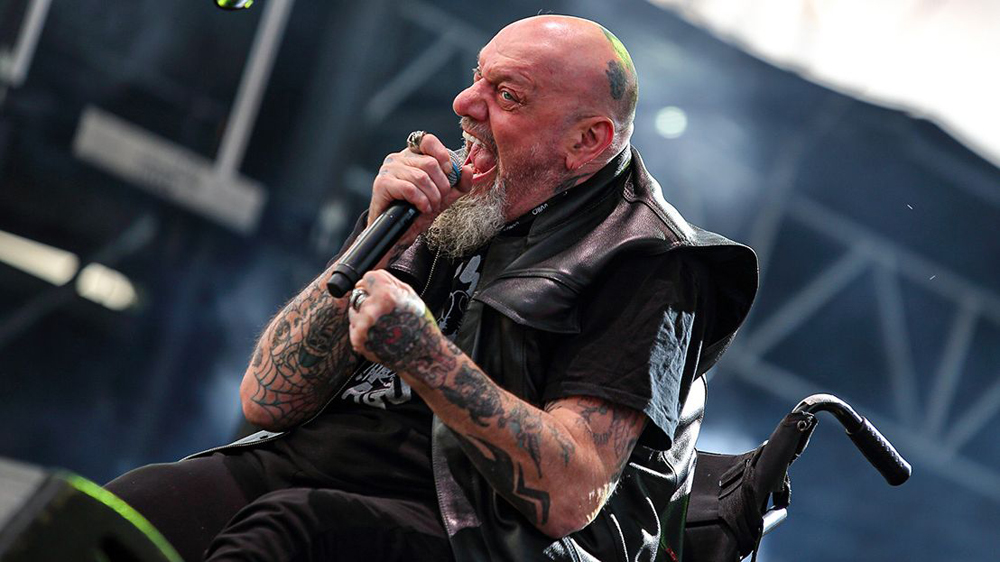Di’Anno fronted the legendary heavy metal band from 1978 to 1981

Former Iron Maiden singer Paul Di’Anno has died. The news of his passing was confirmed by his record label Conquest Music in a statement. He was 66-years old.
“On behalf of his family, Conquest Music are sad to confirm the death of Paul Andrews, professionally known as Paul Di’Anno. Paul passed away at his home in Salisbury at the age of 66.
Born in Chingford, East London on 17 May 1958, Paul first came to prominence as lead singer of English Heavy Metal band, Iron Maiden between 1978 and 1981. He sang on their groundbreaking debut album Iron Maiden, and the influential follow up release, Killers.
Since leaving Iron Maiden, Paul Di’Anno had a long and eventful recording career with Battlezone and Killers as well as numerous solo releases and guest appearances. Despite being troubled by severe health issues in recent years that restricted him to performing in a wheelchair, Paul continued to entertain his fans around the world, racking up well over 100 shows since 2023. His first career retrospective album, The Book of the Beast was released in September 2024 and featured highlights of his recordings since leaving Iron Maiden.
Conquest Music are proud to have had Paul Di’Anno in our artist family and ask his legion of fans to raise a glass in his memory.”
Iron Maiden also issued a statement regarding Paul’s passing.
“We are all deeply saddened to learn about the passing of Paul Di’Anno earlier today. Paul’s contribution to Iron Maiden was immense and helped set us on the path we have been travelling as a band for almost five decades. His pioneering presence as a frontman and vocalist, both on stage and on our first two albums, will be very fondly remembered not just by us, but by fans around the world. We were very grateful to have had the chance to catch up a couple of years ago and to spend time with him once more. On behalf of the band, Rod and Andy, and the whole Iron Maiden team, we extend our deepest sympathies to Paul’s family and close friends. Rest In Peace Paul.”
Bassist Steve Harris also paid tribute to this former bandmate.
“It’s just so sad he’s gone,” Harris stated. “I was in touch with him only recently as we texted each other about West Ham and their ups and downs. At least he was still gigging until recently, it was something that kept him going, to be out there whenever he could. He will be missed by us all. Rest in peace mate.”
Paul Di’Anno was born Paul Andrews in Chingford, a suburb of London, England. He grew up in a working-class environment, where his rebellious nature found a natural outlet in the punk rock and heavy metal scenes. Di’Anno’s vocal style was heavily influenced by the raw aggression of punk, a genre that was booming in the late 1970s in the UK, as well as by hard rock and metal icons such as Led Zeppelin and Deep Purple.
Before breaking into the heavy metal scene, Di’Anno worked various jobs, including as a butcher and chef, while pursuing music on the side. His musical journey began when he started performing with several local bands in London, gradually making a name for himself in the burgeoning punk and metal scenes of the late 1970s.
Paul Di’Anno’s most notable contribution to the heavy metal world came when he became the original frontman for Iron Maiden in 1978. He was recruited by bassist and band founder Steve Harris, impressed by Di’Anno’s gritty voice and rebellious attitude. Di’Anno’s punk-infused vocal style gave Iron Maiden a unique edge during their formative years, which helped the band stand out in the developing New Wave of British Heavy Metal (NWOBHM) movement.
Di’Anno’s tenure with Iron Maiden produced two iconic albums:
- “Iron Maiden” (1980) – This debut album was a raw and energetic introduction to Iron Maiden’s sound. Di’Anno’s rough vocals complemented the fast-paced, aggressive riffs and set the stage for the band’s rise to prominence. Tracks like “Prowler,” “Running Free,” and “Phantom of the Opera” became instant classics, with Di’Anno’s voice providing a rebellious energy that appealed to punk and metal fans alike.
- “Killers” (1981) – The second album, “Killers,” showcased a more refined version of Iron Maiden’s early sound. Produced by the legendary Martin Birch, the album featured standout tracks like “Wrathchild” and the title track “Killers.” Di’Anno’s voice was still a driving force, but tensions between him and the rest of the band began to surface during the recording process. His aggressive lifestyle, which included heavy drinking and drug use, started to interfere with his performances and reliability.
Di’Anno’s time with Iron Maiden came to an end in 1981 when the band decided to part ways with him due to his erratic behavior and inability to cope with the pressures of touring. He was replaced by Bruce Dickinson, who would go on to become Iron Maiden’s most famous vocalist. Despite his short tenure, Di’Anno’s contributions laid the foundation for Iron Maiden’s eventual global success.
After leaving Iron Maiden, Paul Di’Anno pursued various musical projects and launched a solo career. Though he never achieved the same level of success as he did with Maiden, he remained a respected figure in the heavy metal community.
- Paul Di’Anno’s Battlezone (1985–1990, 1998): One of his more significant projects, Battlezone was a heavy metal band that allowed Di’Anno to continue developing his music. The band released three studio albums: “Fighting Back” (1986), “Children of Madness” (1987), and “Feel My Pain” (1998). The group experienced lineup changes, and though commercially less successful, they maintained a loyal fanbase.
- Di’Anno (1984): Paul Di’Anno’s solo project, released under his own name, was a brief attempt to explore a different musical direction, incorporating more rock-oriented elements into his sound. The album received mixed reviews and struggled to find a wider audience.
- Killers (1990–2001): Another notable band was Killers, which Di’Anno formed in the late 1980s. The band’s name was a tribute to his time with Iron Maiden. Killers released albums like “Murder One” (1992) and “Menace to Society” (1994). Di’Anno’s vocal work remained aggressive, with Killers adopting a more traditional heavy metal sound.
- Numerous Projects and Collaborations: Di’Anno was involved in various other projects throughout the 1990s and 2000s, often collaborating with other bands and musicians in the heavy metal scene. He also performed Iron Maiden classics during live performances, much to the delight of fans who remembered him as the band’s first voice.
Di’Anno’s post-Iron Maiden years were marked by personal struggles. His heavy lifestyle, which included battles with substance abuse, took a toll on his health and career. Legal troubles, including imprisonment for benefit fraud in the UK, further hampered his ability to maintain a steady music career.
In the 2010s, Di’Anno’s health worsened. He developed severe knee problems that left him wheelchair-bound for a period of time, limiting his ability to tour. Despite these setbacks, Di’Anno continued to perform when possible, showing resilience in the face of adversity.
Although his career was overshadowed by Iron Maiden’s later success with Bruce Dickinson, Paul Di’Anno remains a pivotal figure in the history of heavy metal. His raw, punk-influenced vocal style helped shape the early sound of Iron Maiden and contributed to the development of the NWOBHM movement, which would influence countless bands in the metal genre.
Many Iron Maiden fans still hold Di’Anno’s era of the band in high regard, and his work on the first two albums is celebrated for its raw energy and authenticity. He may not have had the longevity of some of his contemporaries, but Paul Di’Anno’s contributions to heavy metal are indelible.
